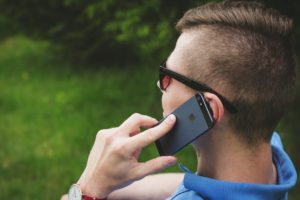Distractions / Coping Mechanisms:
SOCIAL
- Call a friend or family member
- Talk to your sponsor or sobe
 r living manager
r living manager - Talk to a housemate
- Call a mental health hotline
- Go to a recovery meeting
- Meet new people with similar interests
- Go to a public place where you feel safe being around other people. It could be a movie theater, a park, the mall, etc. This can be a helpful starting point of getting comfortable around people without having to interact with them. This can be considered a form of passive socializing.
PHYSICAL/ SENSORY
- Go for a walk
- Walk barefoot on grass
- Play with putty/ clay
- Hold ice until it melts
- Throw ice against the wall outside
- Jump in the pool
- Take a cold shower
- Take a hot shower or bath
- Eat something sour
- Rip up/ destroy paper or cloth
- Use a stick to hit a tree
- Scream into a pillow, punch or kick a pillow
- Squeeze something soft and hold it for a few seconds, then release and repeat
- Listen to songs that you love to sing along to, and focus on the vibrations of your voice in your head and chest
- Give yourself a quick hand massage
- Focus on your breath and watch your chest and stomach rise with each inhale (bonus: use one hand to trace the other, going up a finger on the inhale and down the finger on the exhale. This engages multiple senses and helps with distracting your brain)
- Try this Emotional Freedom Technique video that explores tapping. It is a mind-body technique that involves tapping on specific points on the body to help manage emotions and relieve stress and anxiety. www.vimeo.com/524247681
- Practice relaxation techniques - Relaxation techniques like deep breathing, progressive muscle relaxation, and meditation can help in moments of high stress. Below are a few guided relaxation videos.
- You can also try the 4-7-8 breathing technique, which involves breathing in deeply through your nose for four counts, holding your breath for seven counts, then slowly releasing your breath through your pursed lips for eight counts.
- Improve your sleep - Create a pre-sleep routine that promotes relaxation, like dimming lights, reducing screen time, and reading. You can also try using a white noise machine, earplugs, or soothing music to help you relax. There are sleep music playlists on YouTube or Spotify that are designed for people with conditions like ADHD or panic disorders that use specific beats per minute to help calm your brain (called “binaural beats”)
MENTAL/ EMOTIONAL
- Express yourself through making art or music (this also counts as a sensory coping skill!)
- Write some poems about how you feel
- Write how you feel in a journal or a letter to someone (it’s your decision if you want to send the letter!)
- Watch a YouTube video about a topic you’re interested in
- Watch a favorite TV show or nostalgic movie - bonus points for something that will make you laugh! The goal with this one is to provide comfort through familiarity.
